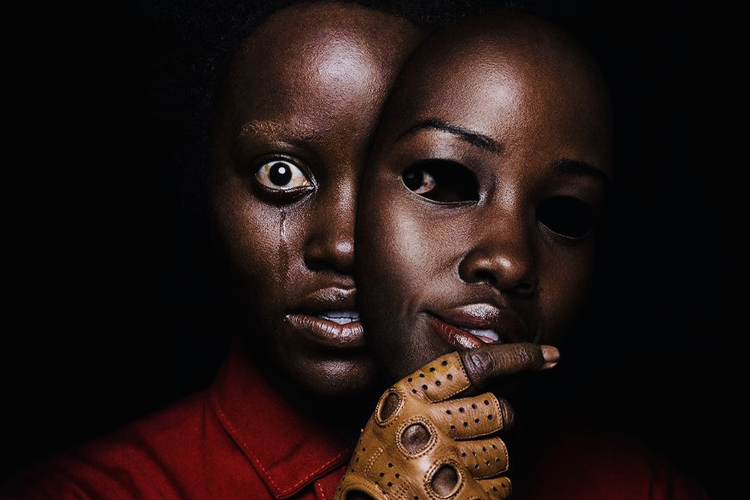What a difference a year can make! At the beginning of 2016, Jordan Peele was primarily known for being one half of sketch comedy duo Key & Peele. At the beginning of 2017, he was Jordan Peele, horror master, director of the critically adored hit Get Out. Peele surprised the world with his blend of filmmaking prowess and deft social commentary, kicking off his oeuvre with a film good enough to earn him creative control over The Twilight Zone. Now, at the beginning of 2019, his follow-up Us is hitting theaters. Is it scary? Is it good? Is it scary good?
Its setup is certainly intriguing. Us follows the archetypal Wilson family on a beach trip to Santa Cruz. Adelaide, the Wilson family mother (Lupita Nyong’o), is nervous about returning to that beach: when she was there as a little girl, she wandered into a hall of mirrors and came face to face with a doppelgänger of herself—you know, standard childhood trauma. Adelaide’s husband Gabe (Winston Duke) is (understandably) skeptical of her story, but his doubts fade away when an entire family of Wilson family doppelgängers shows up at their door.
These doppelgängers aren’t friendly—in fact, they’re a little on the murderous side—and they call themselves “the Tethered”. The Wilson family doppelgängers are disturbing on sight alone, thanks in part to inspired character design: the Tethered wear all-red jumpsuits, move quickly and quietly, and carry rather imposing pairs of scissors. Their menace only increases when one of them opens her mouth.
Doppelgänger Adelaide (Lupita Nyong’o, obviously) speaks in a quivering, fragmented, raspy voice that immediately put my brain in fight or flight mode. Nyong’o’s dual performance is a knockout: as Adelaide, she’s guarded yet sympathetic, clearly repressing some internal struggle; as the spokesperson of the Tethered, she invokes a deep-seated fear with her wide-eyed stare and ferocious physicality. Every actor in the Wilson family impresses in their alternate roles, but it’s Nyong’o who’s horrifying enough to be unfairly ignored by The Academy come awards season.
Credit is also due to Peele, who knows how the doppelgängers should be framed and lit in order to induce maximum dread. Peele’s direction is more assured here than it was in Get Out: pacing, editing, cinematography, and score cohere into a tangibly singular vision. Us feels distinct, like the work of a filmmaker who knows what he’s doing.
Though he is still figuring out how to blend genres. The comedic moments of Us (of which there are aplenty) feel like breaks from the horror rather than natural parts of it. Too often, the movie slams the brakes on its scares to fire off a witty zinger, or to practically beg for applause from the audience. This is Jordan Peele we’re talking about, so the comedy is genuinely funny—but Us is less of a horror/comedy than it is sometimes a horror and sometimes a comedy.
It is scarier than Get Out, though. And subtler: Get Out featured a monologue that outright explained the movie’s subtext to the viewer. Its dominant themes—racism disguised as post-racialism, the fetishization of black bodies—weren’t hard to miss, but Get Out still spelled them out like it was a Subtext 101 class. Us is not as keen to point out its themes, but perhaps it should’ve been: its subtext is a bit muddled. Themes of colonization are hidden behind blink-and-you’ll-miss-it Native American iconography, political symbols seem to suggest different allegories functioning simultaneously, and Peele’s increased focus on genre horror obscures its thematic points a little. The symbols utilized throughout Us are meaningful and exciting to dissect, but because the movie lacks thematic clarity, seeking interpretation feels like mere speculation.
The plot of Us swings the other direction. It is, at times, utterly obvious. One major twist is telegraphed repeatedly before it happens (even on a t-shirt), lessening the third act’s element of surprise. Peele uses another shameless monologue to explain away the movie’s narrative mysteries. Us is an odd combination of plot that’s occasionally predictable and subtext that’s occasionally inscrutable.
Peele is still doing a lot right, though, and more thoughtfully than many of his peers. Us works as a horror, it works as a comedy, and it works as a social commentary, even if Peele is still finding the best way to balance what he brings to the table. He hasn’t achieved the horror-as-commentary greatness of George Romero—the subdued but thorough critique of capitalism in 1978’s Dawn of the Dead, for example—but Us still suggests that Peele’s early films are templates for the masterpiece he could one day make.
★★★½ (3.5/5)




